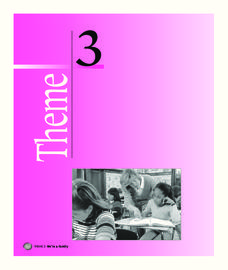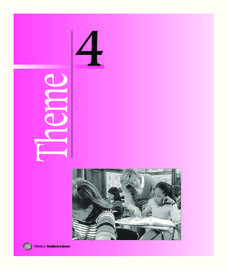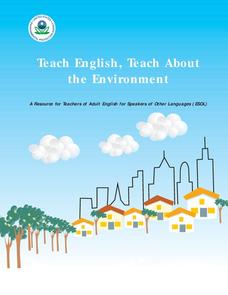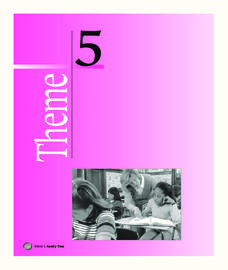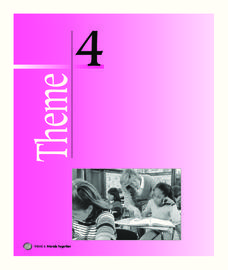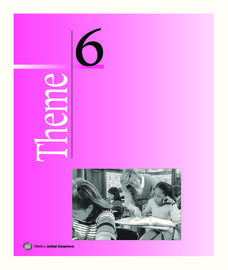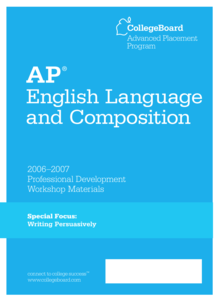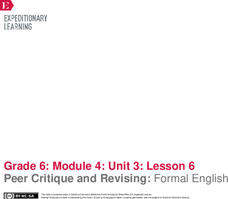Houghton Mifflin Harcourt
We’re a Family: English Language Development Lessons (Theme 3)
Teach your English language learners how to talk about their families with three weeks of lessons. Over the course of the thematic unit, learners pick up new vocabulary so that they can talk about families and relationships, clothing,...
Houghton Mifflin Harcourt
Problem Solvers: English Language Development Lessons (Theme 4)
How can you teach a text to a group of readers who struggling with the language? The second in a set of three ESL lessons related to Theme 4: Problem Solvers engages English language learners by introducing vocabulary and grammar...
College Board
AP® English Language Special Focus: Using Sources
What is the most effective way to teach scholars how to write a research paper? Educators explore the topic with the AP® English Language and Composition exam resource. The reference material guides teachers in best practices for using...
US Environmental Protection Agency
Teach English, Teach About the Environment
Spread the message of recycling while teaching your English language learners new vocabulary and practicing verb tenses. Included here are four lesson plans for each level (beginning, intermediate, and advanced) as well as accompanying...
Really Good Stuff
English/Spanish Cognates: Food
Everyone loves food! Help your English language learners pick up some vocabulary with a series of activities based around cognates and food. Pupils practice each word and focus on the words in-depth by filling out Frayer model...
Read Works
Figurative Language
Here's a richly detailed unit, designed for second graders, that focuses on decoding figurative language, including similes, metaphors, personification and idioms.
British Council
Learning English through Short Stories
Use short stories to teach English? Yes! Designed as a professional development opportunity for English language teachers, the ideas in this booklet can easily be adapted to advanced ESL/ELL classes.
College Board
AP® English Language and Composition: The Rhetoric
Does it seem impossible to make academic growth with advanced learners? Without rigorous instruction, it likely is impossible. The AP® English Language and Composition: The Rhetoric offers a complete resource for educators teaching...
English English
English Placement Test
Ninety multiple choice questions make up an interactive test designed to examine scholars' English language proficiency. After completing , learners have the chance to view their results, retest, or preview an answer key.
Houghton Mifflin Harcourt
Family Time: English Language Development Lessons (Theme 5)
Support English language development with a family-themed unit consisting of a series of lessons designed to get your scholars moving, looking, speaking, writing, and listening. Conversation topics include birthdays, family...
College Board
2003 AP® English Language and Composition Free-Response Questions Form B
You took the words right out of my mouth! One question in 2003 AP® English Language and Composition Free-Response Questions Form B allows scholars to develop opinions on pupils receiving zeros for plagiarism. Other essays analyze ideas...
American English
Welcome to the Color Vowel Chart
Focus English language learners' attention on word stress and phrase stress with a pronunciation chart that breaks the sounds into moving and non-moving vowel sounds. The chart tool uses colors and key words to indicate where to put the...
Houghton Mifflin Harcourt
Friends Together: English Language Development Lessons (Theme 4)
Enjoy this thematic friendship unit compiled with ESL lessons to develop strong language development while listening, speaking, looking, and moving. Class members participate in activities covering topics like making friends, asking for...
College Board
AP® English Language: Reading and Writing Analytically
How can teachers ensure their pupils are well prepared for the AP® English exam? The reference material is a good place to start! Educators read seven essays detailing best practices for teaching scholars to read critically and write...
Houghton Mifflin Harcourt
Talent Show: English Language Development Lessons (Theme 6)
This 32-page packet, the second in the series of support materials for the Houghton Mifflin Harcourt thematic entitled "Talent Show," is designed specifically to support language learners.
MENSA Education & Research Foundation
Magical Musical Tour: Using Lyrics to Teach Literary Elements
Language arts learners don't need a lecture about poetry; they listen to poetry every day on the radio! Apply skills from literary analysis to famous songs and beautiful lyrics with a activity about literary devices. As class...
Houghton Mifflin Harcourt
Animal Encounters: English Language Development Lessons (Theme 6)
Denali National Park and the rain forests of Brazil are the settings for a series of lessons on animal encounters with grizzly bears and golden lion tamarins. The 32-page packet includes scripted lesson plans, activity suggestions, and...
Achieve3000
Figurative Language
Similes and metaphors make writing more beautiful and detailed, but can be a little harder to decipher during a first reading. Use a passage from The Man Who Loved Words to show young readers how to think through passages that contain...
Curated OER
Teaching Debate to ESL Students
Language learners use the debate format to practice formulating, expressing, and defending their ideas. Working in teams, class members develop resolutions, use opinion indicators to express their opinions and reasons, and prepare...
College Board
AP® English Language and Composition Special Focus: Writing Persuasively
It's not always easy to persuade others. However, it may even be harder to teach others how to be persuasive. Educators get personal insight from Brent Staples, an influential commentator, as well as gain ideas and activities on teaching...
Illinois State Board of Education
Common Core Teaching and Learning Strategies
Here's a resource that deserves a place in your curriculum library, whether or not your school has adopted the Common Core. Designed for middle and high school language arts classes, the packet is packed with teaching tips, materials,...
EngageNY
Peer Critique and Revising: Formal English
Dear Sir or Madam: What's the difference between formal and informal language? Scholars focus on using formal English and transitions in their position papers. After revising their rough drafts, they engage in the peer editing process...
The New York Times
Evaluating Sources in a ‘Post-Truth’ World: Ideas for Teaching and Learning about Fake News
The framers of the United States Constitution felt a free press was so essential to a democracy that they granted the press the protection it needed to hold the powerful to account in the First Amendment. Today, digital natives need to...
Curated OER
Using Games to Reinforce Vocabulary Development in English Language Learners
Practical ways to implement games and activities into whole-class and sheltered English language development time.


